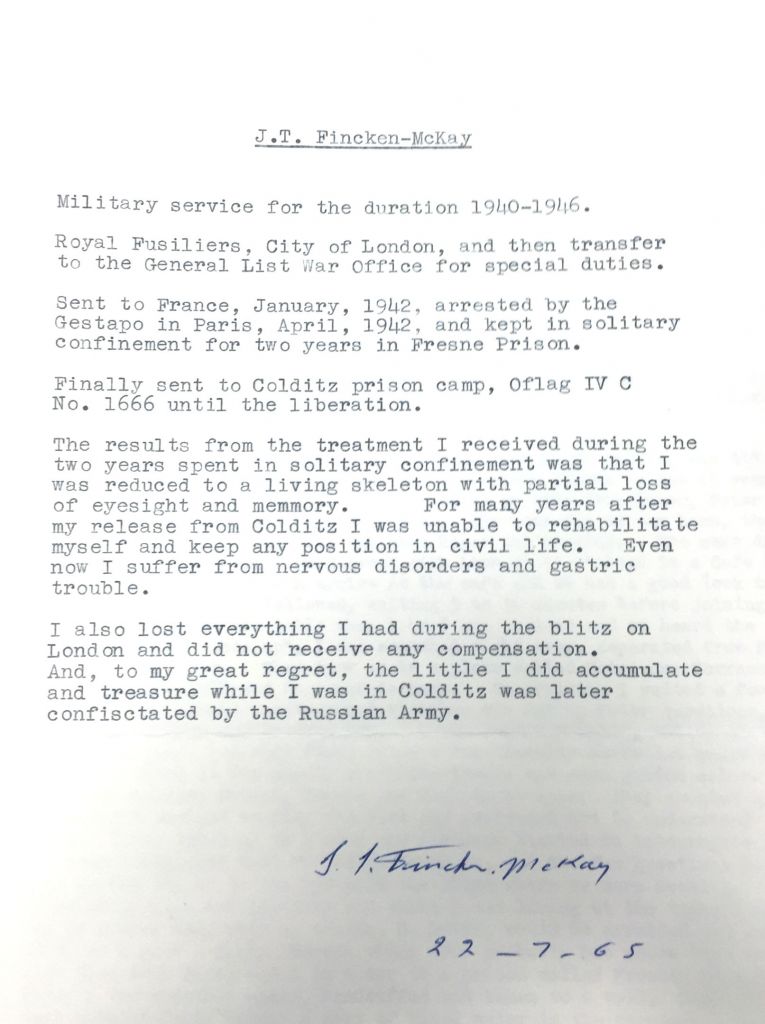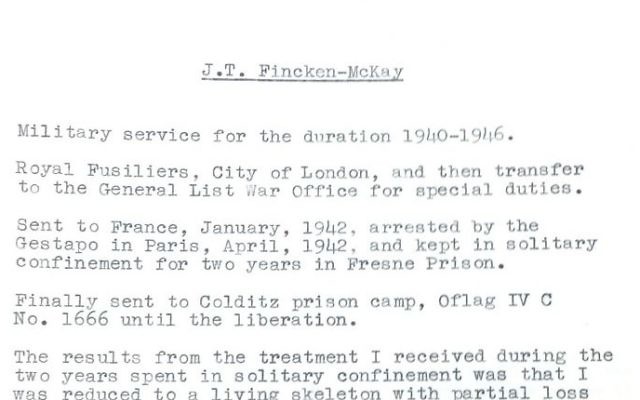UK denied payout to agent who became a ‘living skeleton’ at hands of Gestapo
Britain refused to give compensation to ex-serviceman Jack Thorez Finken-McKay, as revealed in dozens of archived filed released by the National Archives at Kew
The British government denied compensation to a Second World War hero who spent two years in solitary confinement at a prisoner-of-war camp due to a technicality about where he was detained, official papers show.
Jack Thorez Finken-McKay, a British serviceman transferred from the Royal Fusiliers to the War Office to perform “special duties”, said he became “a living skeleton” at the hands of the Gestapo.
He had been arrested and interrogated in France before being sent to a POW camp in Germany.
He said he suffered partial blindness, memory loss and mental health issues as a result of his incarceration and treatment at the notorious Colditz Castle, according to newly released records.
Two decades after his release, the secret agent was among thousands applying for compensation from the British government after the Federal Republic of Germany agree to hand over £1 million to be doled out to those who suffered at the hands of the Nazis.
But Mr Finken-McKay’s claim was dismissed by a Foreign Office official, who claimed that despite his ordeal, he was not eligible for money.
A note from the official, a Miss A Windham, addressed to Mr Finken-McKay in December 1965, states: “Your application has been carefully considered but I am sorry to have to tell you that, on the information provided, it cannot be registered.
“The reason for this is that the prisons and camps in which you were detained were not Nazi concentration camps or comparable institutions.”
The files are among dozens released by the National Archives at Kew, west London, where similar tales of bravery and brutality were told to Foreign Office representatives in the hope of receiving compensation.
Heroes of the Great Escape were among those remunerated, documents show, with payouts of £2,293 offered to the families of Flight Lieutenants Edgar Spottiswoode Humphreys, Gilbert William Waleen, John Francis Williams, and Cyril Douglas Swain.
All these men fled the Stalag Luft III POW camp in 1944 but were recaptured and executed by the Gestapo.
Lauren Willmott, records specialist at the National Archives, said the British Government faced an impossible task in assigning compensation owing to the strict rules on providing official documentation that proved time spent in a concentration camp.
She said: “It was tricky – it was 20 years after the event.

“A lot of people held in the camps had died in the camps or died in the years since the compensation scheme came into effect.
“The files show that some people did miss out, but what’s important is remembering they only had that £1 million to distribute so it was a sort-of impossible task for the Foreign Office as well on a case by case basis.
“If they didn’t meet that criteria, they had to decide ‘If we reject this person, we have to reject others as well.’
“It was a bureaucratic process. There was no way around having eligibility criteria when there were so many victims.”
It was only after a Parliamentary inquiry was held in 1968 following a public outcry that it was decided survivors from POW camps such as the infamous Sachsenhausen should be compensated from a separate pot of money.

Thank you for helping to make Jewish News the leading source of news and opinion for the UK Jewish community. Today we're asking for your invaluable help to continue putting our community first in everything we do.
For as little as £5 a month you can help sustain the vital work we do in celebrating and standing up for Jewish life in Britain.
Jewish News holds our community together and keeps us connected. Like a synagogue, it’s where people turn to feel part of something bigger. It also proudly shows the rest of Britain the vibrancy and rich culture of modern Jewish life.
You can make a quick and easy one-off or monthly contribution of £5, £10, £20 or any other sum you’re comfortable with.
100% of your donation will help us continue celebrating our community, in all its dynamic diversity...
Engaging
Being a community platform means so much more than producing a newspaper and website. One of our proudest roles is media partnering with our invaluable charities to amplify the outstanding work they do to help us all.
Celebrating
There’s no shortage of oys in the world but Jewish News takes every opportunity to celebrate the joys too, through projects like Night of Heroes, 40 Under 40 and other compelling countdowns that make the community kvell with pride.
Pioneering
In the first collaboration between media outlets from different faiths, Jewish News worked with British Muslim TV and Church Times to produce a list of young activists leading the way on interfaith understanding.
Campaigning
Royal Mail issued a stamp honouring Holocaust hero Sir Nicholas Winton after a Jewish News campaign attracted more than 100,000 backers. Jewish Newsalso produces special editions of the paper highlighting pressing issues including mental health and Holocaust remembrance.
Easy access
In an age when news is readily accessible, Jewish News provides high-quality content free online and offline, removing any financial barriers to connecting people.
Voice of our community to wider society
The Jewish News team regularly appears on TV, radio and on the pages of the national press to comment on stories about the Jewish community. Easy access to the paper on the streets of London also means Jewish News provides an invaluable window into the community for the country at large.
We hope you agree all this is worth preserving.






















